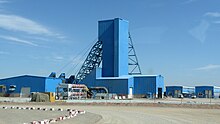User talk:Saikhanbileg.B
Political career[edit]

Saikhanbileg joined the Democratic Party, having been president of the Mongolian Youth Federation from 1997 to 2002.[1] From 2008 to 2012, he served as the leader of the Democratic caucus in parliament.[2] Prior to being appointed Prime Minister Saikhanbileg was Mongolia's Minister of Education.[3] He became Prime Minister on 21 November 2014, succeeding the acting Prime Minister, who took office following the 5 November no-confidence vote, which saw Norovyn Altankhuyag removed from office.[4] Saikhanbileg's appointment to Prime Minister was opposed by the Mongolian People's Party (MPP), on the grounds that as a cabinet minister, he was part of the group of politicians who "overlooked growing economic problems." The MPP refused to participate in the vote, and Saikhanbileg was elected by a vote of 42-2.[5]
Saikhanbileg's major task as Prime Minister has been to improve foreign investment in Mongolia, which took a dramatic turn for the worse in 2013, when Rio Tinto halted expansion at the Oyu Tolgoi mine in the Ömnögovi Province. Foreign investment fell nearly US$4 billion between 2012 and 2015.[6] In 2015 Saikhanbileg called for a "text-message referendum", polling the country for their opinion on major mining projects. When asked if the country should try to get out of financial trouble by support mining projects through investment, or cut costs, approximately 56% supported investment.[7]
- ^ "Chimed SAIKHANBILEG". State Great Hural. Retrieved 6 April 2015.
- ^ Cite error: The named reference
blogswas invoked but never defined (see the help page). - ^ "President Introduced the Nominee for the Prime Minister to the Parliament". Office of the President of Mongolia. Retrieved 5 April 2015.
- ^ Edwards, Terrence; Stanway, David (21 November 2014). "Saikhanbileg appointed as new Mongolian prime minister". Reuters. Retrieved 5 April 2015.
- ^ Cite error: The named reference
law firmwas invoked but never defined (see the help page). - ^ Kohn, Michael (5 April 2015). "Mongolia's Leader Takes to TV and Texting to Win Back Investment". Bloomberg. Retrieved 5 April 2015.
- ^ Edwards, Terrence (4 February 2015). "UPDATE 1-Mongolian "text referendum" backs mine investment over austerity". Reuters. Retrieved 5 April 2015.
